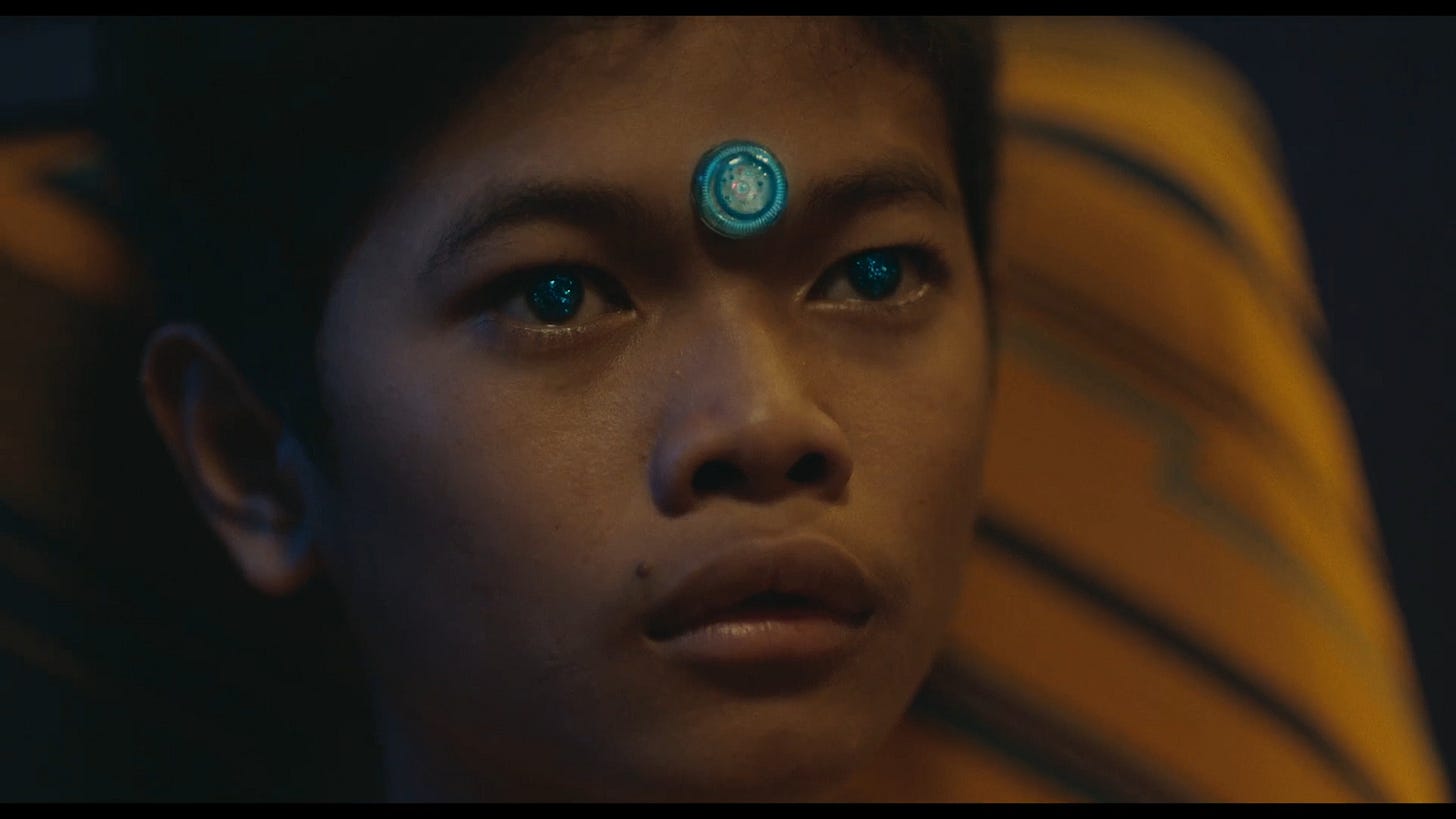Karmalink Pursues Its Own Unique Path to Enlightenment
The first Cambodian science-fiction film is a gem.
Rating: 8/10
Jake Wachtel’s debut Karmalink is a genuinely unusual film. It’s not a pulpy action adventure, not a quirky indie interpersonal drama, not a prestige high concept exercise. It’s loose but lyrical and amateurishly nonchalant but ambitious. It’s one of those rare movies that really seems to have its own point of view and sense of purpose, and the courage and curiosity to follow both wherever they happen to lead.
Wachtel is American, but his film was made entirely with Cambodian actors in Cambodia. In fact, it’s the first science-fiction film made in that country, mixing tech futurism and Buddhist spirituality. Though Karmalink elliptically explores painful issues of colonial displacement and identity, its approach is resolutely gentle. This is a near-future dystopia that radiates hope.
The McGuffin of Enlightenment
A teen boy, Leng Heng (Leng Heng Prak), and his family are about to be evicted by developers from their long-time home in Phnom Penh. Leng Heng thinks he can save his home if he can locate a golden Buddha he often sees in his dreams, and which he believes he stole in a past life. He hires and cajoles a forager and scam artist name Srey Leak (Srey Leak Chhith) into helping him seek the treasure.
Eventually the two realize that Leng Heng’s memories are connected to the neural net research of Dr. Vattanak Sovann (Sahajak Boonthanakit), and that Vattanak may be Leng Heng’s previous incarnation. Also involved is Dr. Sophia (Cindy Sirinya Bishop), who has been helping Leng Heng’s grandmother with her advancing memory loss.
The golden Buddha is an obvious McGuffin; it’s just an object to set the plot moving. But it’s also the Buddha—enlightenment, transcendence, the truth.
The pulp narrative and the spiritual quest could build on each other in escalating tension. Instead, rather marvelously, they cancel and dissipate. The movie has little in the way of forward momentum or urgency. Instead it lingers on Cambodian people mingling in the street, enjoying the skyline and the architecture. The acting is charmingly amateurish, and Leng Heng and Srey Leak often seem like two kids wandering around their city being filmed by a friend or relative.
Leng Heng is all gangly limbs and hopeful, open glances. His whole face lights up when he introduces Srey Leak to his family. Scenes of him stroking his grandmother’s arm to comfort her or just to express affection are impossibly tender.
Who Owns the Buddha?
The familial and community affection is threatened by displacement. And Leng Heng himself is threatened by the memories he seeks.
Vattanak’s neural net could be the key to the next stage in human consciousness and evolution. But as with the ancestor who stole the Buddha, there’s a question of whether the AI-boosted brain has a right to the enlightenment it’s digitally laying claim to. Truth can be beautiful, but it can also be a kind of colonial imposition, erasing competing dreams and perspectives.
In their pursuit of the Buddha, Leng Heng and Srey Leak procure augments. These are small circular devices they attach to their foreheads, suggesting a third eye. Thus equipped, they can connect to a kind of world-wild web of nanotechnology,. The augment also gives Leng Heng the ability to record his dreams. Tech offers a new broader vision, but commodified and possibly cheapened. “These augmented hipsters are ruining everything,” Srey Leak quips.
It’s significant that the gold Buddha was only one of a group of artifacts, many of which were stolen by Western colonial plunderers. Only some have been returned. A priest tells Leng Heng and Srey Leak that the object they seek may now be part of a “private collection.” Enlightenment can be communal project, which everyone attains together. But for some it’s a personal quest for individual renown and glory.
It's not clear whether Vattanak is altruistic or selfish. He at first seems to offer Leng Heng a collaboration. But their relationship at times verges on something more like expropriation or theft.
Finding Peace
For his part, the enlightenment Leng Heng finds isn’t gold, but flesh and blood. The relationship between him and Srey Leak is developed so gracefully and with so little fanfare you barely notice it until suddenly it’s the center of the film. A lot of movies tell you that the goal is less important than the journey. But there aren’t many that so gracefully find enlightenment in searching together for a beautiful, unfindable something.
There is a twist ending of sorts. It’s less a plot complication than a kind of metaphysical reiteration that to grab the Buddha is to lose the Buddha, and that neither truth nor self are things you can steal. Leng Heng isn’t exactly who we thought he was, and is also the kind of person we’ve seen he is through the whole film. Nothing really happens in Karmalink. The Buddha is where he always was.


